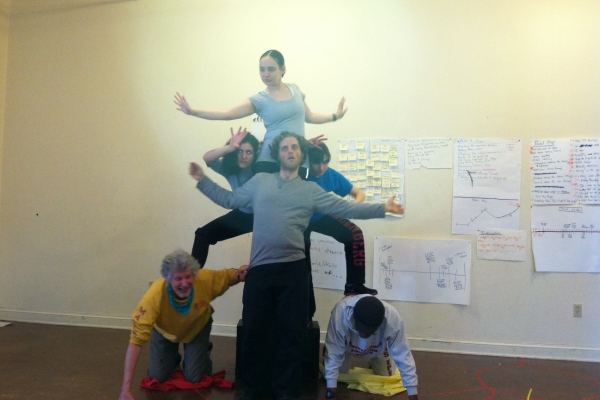Touchstone, The First Visit

(Photo and post by August Schulenburg. Pictured: Bill George, Kayla Prestel, Emma Chong, Gary Warren, Kathryn Krull, Kyle Lewis.)
Following up on my Big Artistic Risk Project (BARP) from several days ago, I’m reporting back from my visit to Touchstone Theatre. I had the pleasure of sitting in on their 8-hour rehearsal for The Odyssey Project. My goals were:
- To observe a devised rehearsal process in the content generating stages;
- To learn more about how The Odyssey Project fits into the overall life of Touchstone and the community of Bethlehem;
- To discuss the practical challenges of producing devised, site-specific and outdoor theatre.
All of that happened and a great deal more. A huge thank you to the Touchstone artists for letting me into their creative space, and to J.P. Jordan and Bill George for our thoughtful and honest conversations about the inner workings of Ensembles.
In honor of the raw material generated in the rehearsal, I will offer a stream of unshaped thoughts, reactions and questions that the day inspired. Out of respect for the early stage of their process, these thoughts are in no way meant to be a reflection on their work but rather what their work inspired within me.
***
Is it possible to be a whole theatre artist without some fundamental connection to music?
The closer to the street, the more multi-faceted the artist. How many of our actors could stand on a corner or ride a subway and entertain anyone that passed? I think of Dog and Zetta and all the vauders who must conjure a theatre space amidst the cacophony of the street through sheer dazzle and will; through juggling and song, miming and music. There is a vitality in street performance that I miss in our more modern Methods.
The point of theatre games before a rehearsal begins in earnest is not to warm up the individual artist, but to warm up the shared body of the Ensemble; to synch breath and mind together.
“Good new ideas could kill us.” Bill George, on the danger–and necessity–of great new ideas when time is running short.
You need to create a permission to fail in the room, otherwise you will miss when the seeming wrong turn is actually the right direction.
How can you table ideas in devised work so that the rehearsal moves forward, but if the end of an alley is reached, those other paths can be attempted? A different role for the stage manager…
Much of this work is the creating of games with clear yet flexible rules and outcomes. Without some rules, the rehearsal falls into the wrong kind of chaos. Without outcomes, there is nothing at stake. But draw the lines of the field and set the goalposts, and something inevitably springs to life.
Beware the choice you thought up ahead of time. You’ll end up playing something that already happened, instead of what’s happening now.
Bias is the opposite of vision: bias restricts what is possible, vision expands it. Yet so often we mistake our biases for vision.
“Spectacle” is used differently here: it is a good thing, desirable; it is the difference between a choice in a 99-seat house and that seem choice with the sky as a grid. Spectacle isn’t a distraction from truth, but the means by which it is communicated with enough vitality to penetrate the open air.
“There is no abstract art. You must always start with something. Afterwards you can remove all traces of reality. There’s no danger then, anyway, because the idea of the object will have left an indelible mark.” – Pablo Picasso
“In a prison this inviting, the walls can disappear.” – The character of Calypso in The Odyssey Project
“Do you know the difference between contentment and satisfaction?” – Caylpso
“I think we need to try for something extravagant.” -Bill George
Working in the space you will eventually perform as often as possible must be the ultimate (if often unattainable) goal, as every space exerts an undeniable pressure that shapes the work, often in invisible ways. And so, you can build a perfect shoe for the wrong foot, and the play will hobble in production…
It may be better to focus on a single risk and dive deeply into it, rather than skim the surface of too many changes.
Don’t get stuck trying to make an early idea work: worrying too much about the how can lose the urgency and clarity of the why.
Each production should have the seeds of the next production within it, or growth will always be a jump instead of a step. Jumping is fun, once in awhile, but do it every time and you’ll burn your legs out.
“I like to see cool things on stage.” – Bill George
We are not trying to make perfect something we already know, but to discover something we don’t.
Much more on all of this for now, but thank you again to the whole Touchstone team for a wonderful beginning!
This project is made possible, in part, through a grant from the Network of Ensemble Theater’s Touring & Exchange Network (NET/TEN), supported by lead funding from The Andrew W. Mellon Foundation and the Doris Duke Charitable Foundation.






Recent Comments